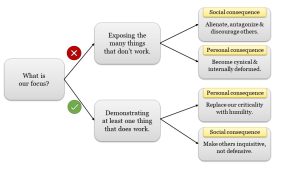 Suppose we have a sense of social responsibility and a zeal for social reform — we will naturally observe things in the world around us and evaluate whether they work properly. And we will frequently find many things that don’t work well or don’t work at all. Feeling concerned or even indignant, we may want to expose those things by criticizing their ineffectiveness.
Suppose we have a sense of social responsibility and a zeal for social reform — we will naturally observe things in the world around us and evaluate whether they work properly. And we will frequently find many things that don’t work well or don’t work at all. Feeling concerned or even indignant, we may want to expose those things by criticizing their ineffectiveness.
While our intention in exposing dysfunctional things may be good, the consequences of our actions may be doubly counterproductive.
Social consequence — Anger or discourage others: Our criticisms may alienate or even antagonize those dedicated souls who are trying to do something good even amid the dysfunctionality. Additionally, our criticisms may dishearten new people from even trying to connect with any cause bigger than themselves; they may mis-infer that all such causes get corrupted.
Personal consequence — Make ourselves self-righteous and cynical: We may unwittingly infect ourselves with a critical mentality that eventually degenerates to a holier-than-thou attitude that delights in seeking faults in others. Thus, even while we are aggressively championing outer reformation, we may make ourselves dangerously vulnerable to inner deformation.
How can we prevent such counterproductive consequences? By shifting our focus from exposing the many things that don’t work to demonstrating at least one thing that does work. Applying what we have learned from our observations, we can try to implement and even embody a reformatory practice that is tangibly transformational. Such focused endeavor will have two beneficial results.
Personal consequence — Replace our criticality with humility: When we try to make even one good thing work, we will realize how difficult it is to make anything worthwhile work. And we will appreciate the Bhagavad-gita (18.48) warning that though all endeavors in this world will be covered by faults, that is not reason enough to devalue or deride them.
Social consequence — Make others inquisitive, not defensive: When we thus develop a healthy appreciation for others’ dedication in attempting something good, our appreciative attitude will rub off on many of them. When we voice our concerns about the limitations of their endeavors, they may well stop justifying their actions and start seeking insights from our example to improve their contributions.
One-sentence summary:
When seeking to reform things, focus not on exposing the many things that don’t work; focus on demonstrating at least one thing that works.
Think it over:
- When we try to expose things that don’t work, what are the counterproductive consequences?
- How can we prevent such consequences?
- When we focus on demonstrating something that works, what are the beneficial results?
***
18.48: Every endeavor is covered by some fault, just as fire is covered by smoke. Therefore one should not give up the work born of his nature, O son of Kunti, even if such work is full of fault.
To know more about this verse, please click on the image


Hare Krishna Sriman Chaitanya Charan Prabhu, thank so very much for the great work you are doing in the disciplic succession Your simple approach to presenting difficult and complex teachings yet not compromising the standard and truth is encouraging. Keep up the good work. May Sri Guru and Gauranga continue to bless and empower you in Their Service.
Thanks, Salika P, for your articulate appreciation and your good wishes. Am humbled and grateful to be of service.